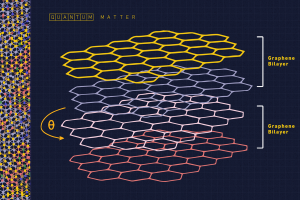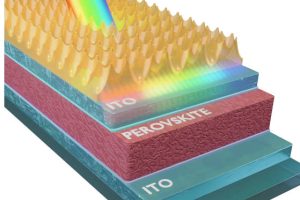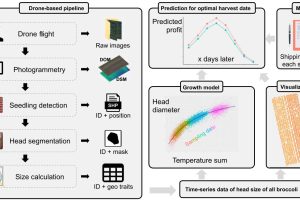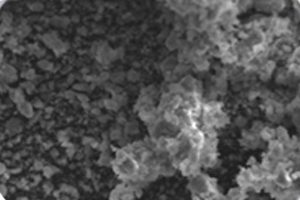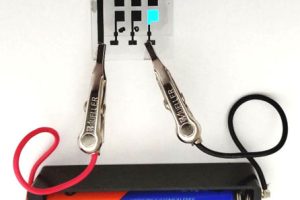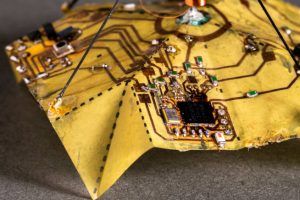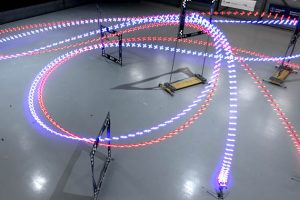For grid-scale energy storage, the search is on for durable batteries made from low-cost materials. Aqueous zinc-iron batteries are one suggestion, where storage is though the reversible plating and stripping of zinc at the anode. One of the problems associated with this chemistry (dendrite growth is another) is hydrogen gas generation from parasitic side-reactions that decompose water – which gradually ...
Research
The latest electronics research news from within the industry and universities from around the world.
Twisted graphene sheets take on exotic identities
A single-atom-thick sheet of graphene has remarkable properties on its own, but things can get even more interesting when you stack up multiple sheets, report researchers at the US National Institute of Standards and Technology (NIST). When two or more overlying sheets of graphene are slightly misaligned — twisted at certain angles relative to each other — they take on ...
Soft gripper weighs 130g, lifts 100kg
Korean engineers and scientists have developed a soft gripper that can be used to lift 100kg, while weighing only 130g. The device is inspired by weaving and can be made at different sizes, always maintaining large ratio between gripping capacity and its own mass. “Utilising soft, flexible materials such as cloth, paper and silicone, soft robotic grippers acts like a ...
Nano-imprint anti-reflection for perovskite solar cells
Solar cells tend to work better with an anti-reflection coating, and perovskite solar cells are no exception. Planar magnesium fluoride anti-reflection coatings work on perovskite cells, but could the nano-scale surface texturing used on some silicon cells be applied to pervoskite cells? This was the question asked at the University of Warsaw, which worked with the Fraunhofer Institute for Solar ...
Use drones and AI for more profitable brussels sprouts
The University of Tokyo has demonstrated a near-autonomous drone-based system to identify the perfect day to pick a crop. “Harvesting a field as little as a day before or after the optimal time could reduce the potential income of that field for the farmer by 3.7% to as much as 20.4%,” said Tokyo researcher Wei Guo. “But optimum harvest times ...
Why old technique makes better battery materials
The University of Birmingham has found a new reason why ball-milling, a technique over 100 years old, makes high-capacity Li-ion electrode materials. The use of ball milling has been a huge area of growth in the lithium-ion battery space, according to the university. It involves rotating precursors to the desired electrode material in a barrel along with hard heavy balls ...
2V blue OLED will work on Li-ion batteries
Tokyo Institute of Technology has demonstrated a blue OLED with a forward voltage of 1.97V at 100cd/m2, and still emitting at lower voltages such as 1.5V (right). “Conventional blue OLEDs typically require around 4V for a luminance of 100cd/m2, this is higher than the industrial target of 3.7 V – the voltage of lithium-ion batteries,” according to the Institute. Its ...
Falling solar-powered e-leaf changes aerodynamics on command
Researchers at the University of Washington have created a battery-free robot that falls through the air in aero-dynamically unstable or stable ways on command. Dropped in clusters, they spread out until commanded to fall straight. “They use an origami fold to switch from tumbling through the air to dropping straight to the ground,” according to the university. “To spread out ...
AI beats humans at drone racing
Drone racing has joined the list of activities where AI beats humans – in multiple races against three world-class humans in this case – following research at the University of Zurich and Intel. “Physical sports are more challenging for AI because they are less predictable than board or video games,” said Zurich head of robotics and perception Davide Scaramuzza. “We ...
UK back in EU Horizon science research programme, and Copernicus, not Euratom
The UK has rejoined the European ‘Horizon’ research programme, having been a big hitter in the programme’s predecessors when the UK was part of the EU. It now has associate status in Horizon – Norway, New Zealand and Israel are already Horizon associates and, according to the UK Government, Korea and Canada are looking to join. “From today, UK researchers ...
 Electronics Weekly Electronics Design & Components Tech News
Electronics Weekly Electronics Design & Components Tech News

